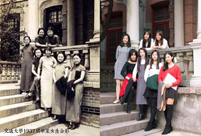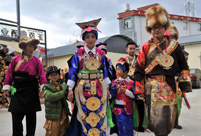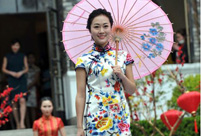


Lei Min (center), a NPC deputy and PLA soldier, calls for more respect for the devotion of military personnel and better protection of their legal rights at a group discussion of the government work report on March 7. (Photo: Lei Sheng from People’s Daily)
With the aim to further improve women’s welfare and rights, China has amended laws and regulations to accelerate gender equality and the overall development of women in the country.
As China’s first law against domestic violence came into effect earlier this March, deputies attending the National People’s Congress (NPC) annual session said the law would further guarantee women’s rights.
Sun Xiaomei, a NPC deputy who has long advocated for the law, applauds the legislation, saying that “women are the highest-risk group facing domestic violence. The law will better protect their rights.”
Riyangul Almire, a female deputy from the rural area of Xinjiang Uyghur Autonomous Region, said that local women’s federations have been promoting the marriage law and anti-domestic violence law through various channels in different languages.
“With the protection of the law, women in rural areas feel safer than before,” she added.
As early as 1954, China’s constitution officially included women’s rights among the fundamental rights of citizens. Later amendments further stipulated protection of women’s rights. A specific law on women’s rights protection was also introduced. The constitution and related laws have ensured the independent and inviolable status of women, granting them the same freedom and dignity that men enjoy.
China's practice has proved that the promotion of women's participation in social and economic activities could effectively improve their social status and economic vitality.
Women’s participation in administration and discussion of state affairs is an important index to measure a country’s degree of humanity. Since the establishment of the people’s congress system, the percentage of female deputies has been increasing.
According to released statistics, 23.4 percent of the deputies are female in this year’s session. Their occupations include diplomats, Olympic champions, grass-roots school principals, as well as farmers.
During the two sessions, Fu Ying, the NPC session spokeswoman, captured public attention once again. As the first female spokesperson of the NPC session, Fu used to be China's ambassador to the Philippines, Australia and the UK.
She said that the NPC and its standing committee will play significant roles in addressing the root causes of corruption and efforts will be placed on the amendments of administration supervision law this year.
Female delegates of the two sessions believe that the nation’s current focus on family values and education has added meaning to the roles of women, which will further advance women’s social progress.

CPPCC members applaud the approval of resolutions during the Fourth Session of the National Committee of the 12th Chinese People's Political Consultative Conference (CPPCC) on Monday at the Great Hall of the People. (Photo : Lei Sheng from People's Daily)
 Thai most beautiful transgender Nong Poy release new photos
Thai most beautiful transgender Nong Poy release new photos Now and then photos of Shanghai Jiaotong University
Now and then photos of Shanghai Jiaotong University Is this what air travel will look like in 2050?
Is this what air travel will look like in 2050? Aerial view of watermelon terraces in S China's Baise
Aerial view of watermelon terraces in S China's Baise Traditional wedding of a post-80s Tibetan couple
Traditional wedding of a post-80s Tibetan couple Models in cheongsams present classical oriental beauty
Models in cheongsams present classical oriental beauty Second commissioned C28A corvette made by China enters Algerian Navy
Second commissioned C28A corvette made by China enters Algerian Navy Intoxicating Wuyuan in spring
Intoxicating Wuyuan in spring Gold and silver wares of Qing Dynasty exhibited in Shenyang Imperial Palace
Gold and silver wares of Qing Dynasty exhibited in Shenyang Imperial Palace Top 20 hottest women in the world in 2014
Top 20 hottest women in the world in 2014 Top 10 hardest languages to learn
Top 10 hardest languages to learn 10 Chinese female stars with most beautiful faces
10 Chinese female stars with most beautiful faces China’s Top 10 Unique Bridges, Highways and Roads
China’s Top 10 Unique Bridges, Highways and Roads Meet Beijing’s hottest new trend: vaping
Meet Beijing’s hottest new trend: vaping Govt to increase scrutiny of online retail: report
Govt to increase scrutiny of online retail: report China’s logistic hub in Djibouti to stabilize region, protect interests
China’s logistic hub in Djibouti to stabilize region, protect interests Myanmar won’t distance itself from China
Myanmar won’t distance itself from ChinaDay|Week